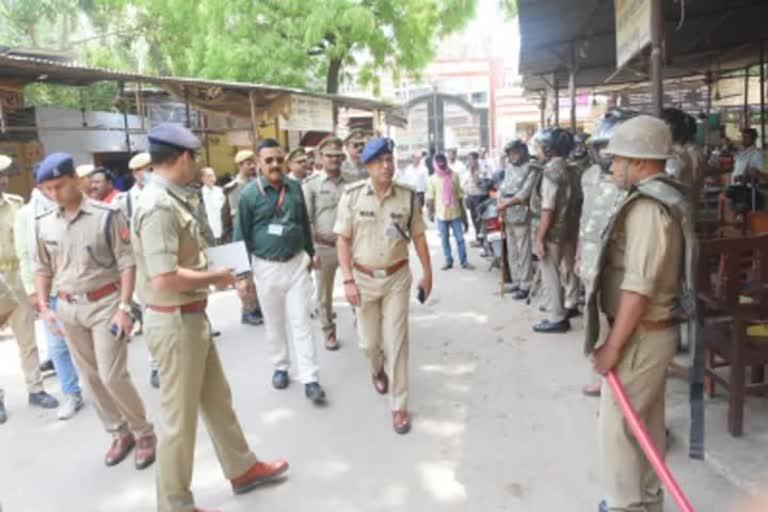Varanasi (UP) : Varanasi district court admitted the plea for prayer in the premises of the Shringar Gauri-Gyanvapi case on Monday. District Judge AK Vishvesh who had last month reserved the order pronounced the verdict on admitting the petition rejecting the claims of the respondent side questioning the maintainability of Hindu women's plea seeking permission to worship Hindu deities in the Gyanvapi Mosque complex.
Ahead of the orders, security has been tightened and prohibitory orders (Section 144) have been imposed in Uttar Pradesh's Varanasi on Sunday a day ahead of the district court order. The police have deployed forces in areas where a mixed population resides in the city and patrolling is ongoing to ensure no law and order situation arises on the maintainability of a plea by five Hindu women seeking permission to worship the Shringar Gauri Sthal within the Kashi Vishwanath-Gyanvapi Masjid complex.
"A Varanasi court may pronounce judgment on a crucial matter. Section 144 was implemented in the city. Police force posted in areas where the mixed population resides. Patrolling is on. We are trying our best that no law and order situation arises," said Police Commissioner, A Satish Ganesh. The petition was filed by five Hindu women seeking permission to worship the Shringar Gauri Sthal within the Kashi Vishwanath-Gyanvapi Masjid complex. Following this, a local Varanasi court ordered a videography survey of the complex in May. The survey work was completed on May 16 and the report was presented in the court on May 19.
Also Read--Court slaps fine on Muslim body in Gyanvapi Shringar Gauri case
After the videography survey claims were made by the Hindu side that a structure, resembling a Shivling was found in the mosque complex. The Masjid committee contested that it was a fountain and not a Shivling. The Supreme Court on May 20 transferred the case from a civil judge (senior division) to a district judge, saying considering the "complexities and sensitivity" of the issue, it is better if a senior judicial officer having an experience of over 25-30 years handles this case.
The bench also said that no manner of restriction should be imposed on Muslims entering the mosque to offer namaz or religious observances. It had ordered that its interim order passed on May 17 -- to protect the area where the Shivling was found and access to Muslims for namaz -- shall continue in operation till maintainability of the suit is decided and thereafter for eight weeks to enable parties to pursue legal remedies.
It had said that District Judge should decide the maintainability of the civil suit in the Gyanvapi-Kashi Vishwanath on priority as sought by Committee of Management Anjuman Intezamia Masjid Varanasi. The matter had reached the Supreme Court on a petition filed by the Mosque Management Committee, which challenged the civil judge's orders. The order permitted inspection, survey, and videography of the mosque's complex to collect evidence about the alleged existence of idols of Hindu deities inside the mosque, which is adjacent to the Kashi Vishwanath Temple.
They filed an application for the protection of the shivling, whereupon the civil judge directed the district magistrate, Varanasi, to seal the area where the shivling was sighted. It also directed the deployment of the CRPF to protect the sealed area and prohibited people from entering it. (with Agency inputs)
